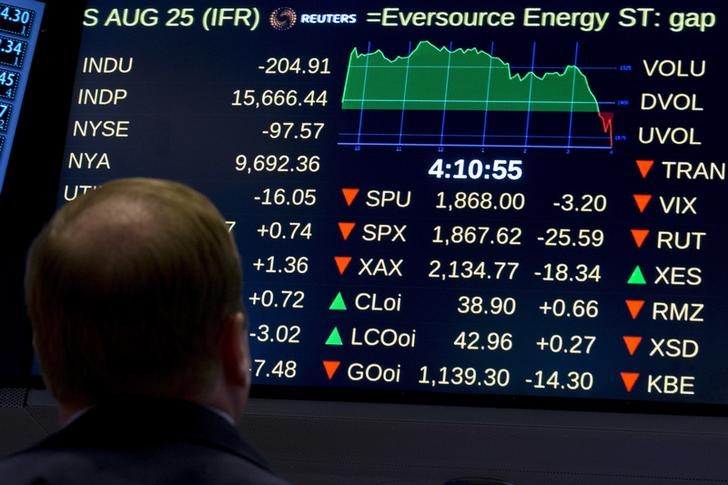By Geoffrey Smith
Investing.com -- ADP publishes its monthly payroll survey and the U.S. reports trade numbers for February. Johnson & Johnson ponies up to settle long-running allegations that its baby powder causes cancer, and the rally in oil prices pauses for breath despite a big drop in U.S. inventories. Here's what's moving markets on Wednesday, 5th April.
1. ADP, trade data due as recession signs spread
All aboard the recession bandwagon. The weakest job vacancy numbers in nearly two years, coupled with further evidence of manufacturing already in recession, form the backdrop to two sets of data which don’t usually garner too much attention.
Today, however, the ADP payrolls report at 08:15 ET (12:15 GMT), and U.S. trade data due 15 minutes later will be seized upon for any further evidence of a slowdown sharp enough to stop the Federal Reserve raising interest rates any further.
The benchmark two-year Treasury note yield, which is closely correlated to Fed expectations, has fallen another 27 basis points so far this week after plummeting in response to last month’s bank collapses. Any downside surprises from the numbers are only likely to push it down further.
2. Johnson & Johnson tries again to end cancer suits
Johnson & Johnson (NYSE:JNJ) offered to pay $9 billion to settle long-running allegations that its talc products caused ovarian cancer, in its most convincing effort yet to draw a line under a lengthy litigation battle.
The company’s LTL Management unit, into which J&J has spun off its baby powder-related liabilities, refiled for bankruptcy protection, hoping to gain approval for a plan that would spread payments to victims over 25 years. A previous effort to do this had been rejected.
J&J has already paid $2.1B in damages to settle some allegations against it. It will take another $6.9B impairment charge against its first-quarter earnings to cover the bulk of the rest of the expected liability.
J&J stock was up 3.1% in prermarket on hopes for a quick end to the saga.
3. Stocks set to extend declines as economy cools
U.S. stocks are set to open lower again, having turned down on Tuesday in response to a Job Openings survey that suggested the labor market is now cooling down quickly. Comments late on Tuesday from Cleveland Fed President Loretta Mester that interest rates will have to stay above 5% for an extended time - regardless of the signals from this week's economic data - aren't helping the mood.
By 05:30 ET, Dow Jones futures were down 65 points, or 0.2%, while S&P 500 futures and Nasdaq 100 futures were down in line. The three main cash indices had fallen for a second straight day on Tuesday in response to the data.
Aside from Johnson & Johnson, stocks likely to be in focus later include food groups ConAgra Foods (NYSE:CAG) and Simply Good (NASDAQ:SMPL), both of which report earnings early, along with pot stock Tilray (NASDAQ:TLRY).
4. Eurozone growth hits 10-month high; von der Leyen, Macron head to China
The Eurozone economy expanded at its fastest pace since May in March, according to final estimates from S&P Global. Southern Europe in particular grew strongly, while France and Germany – both hobbled by extensive strike action in March – limped along.
There was also some good news from the hard data, with German factory orders rising at the fastest pace in nearly two years in February and French industrial production also rising more than forecast.
The bad news is that analysts don’t expect it to last, given the tightening of credit conditions across the region that started well before last month’s banking issues. The euro, which hit a two-month high on Tuesday, was unimpressed.
Europe’s attention is now turning to a trip to Beijing by EU Commission President Ursula von der Leyen and French President Emmanuel Macron. The two will meet President Xi Jinping for talks on Thursday.
5. Oil pauses for breath; U.S. inventories drop again
Crude oil paused for breath after its rally at the start of the week, with even the announcement of another big drop in U.S. inventories unable to push prices higher in the near term. The U.S. government publishes its weekly data at 10:30 ET.
By 05:45 ET, U.S. crude futures were down 0.2% at $80.59 a barrel, while Brent was down 0.2% at $84.78 a barrel – both benchmark blends still close to their recent highs.
The edge came off the rally on Tuesday after Iraqi and Kurdish officials announced a deal to end the blockage of shipments through a pipeline to the Turkish port of Ceyhan. So far, there has been no confirmation of flows resuming, however.
